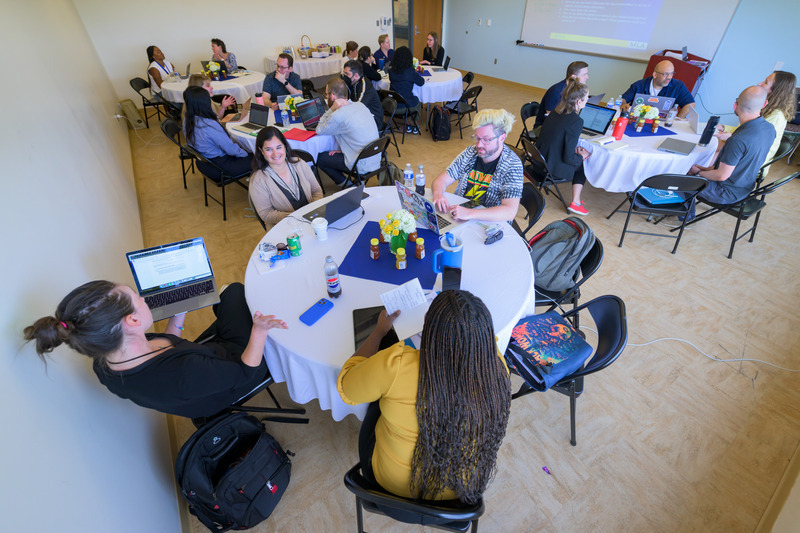
Category: Associate in Arts Program

Institute on Reading and Writing Pedagogy
June 17, 2025 Written by CAS Communication Staff
In May 2025 an article in the Chronicle of Higher Education posed the question: Are students no longer reading in college courses? This article was serendipitously published just days before educators in and around Delaware met to discuss how to leverage reading in the first-year college writing classroom.
The University of Delaware was one of three institutions chosen to partner with the Modern Language Association (MLA) to host the 2024 Institute on Reading and Writing Pedagogy at Access-Oriented Institutions (AOIs). The UD-MLA Institute was part of a broader initiative begun in 2019 and supported by the Teagle and Mellon Foundations to strengthen reading and writing instruction at AOIs across the US.
In 2005, Delaware became the first state in the country to offer two years of free college tuition to recent high school graduates through the SEED program. When the program was expanded in 2021, it positioned Delaware as a national leader in addressing how higher education can adapt to changes in the workforce post pandemic, which made UD an ideal partner to host the institute.

The institute aligns with UD’s commitment to offer low-cost, high-quality pathways for Delawareans to earn their bachelor’s degree, reaching underserved students in their pursuit of education beyond the associate’s degree. In addition to generous funding through the MLA’s Mellon Foundation grant, the five-day event was sponsored by UD’s Interdisciplinary Humanities Research Center and the Office of the Dean of the College of Arts and Sciences. It was supported by the Department of English and the Associate in Arts Program (AAP).
Jessica Edwards, associate professor in the Department of English, and Christine Grogan, associate professor in the AAP, organized and facilitated the program. In addition to participants from UD, the 19 competitively selected fellows included teaching professionals from the following institutions:
Anne Arundel Community College
Community College of Baltimore
Community College of Philadelphia
George Mason University
Georgetown University
Harford Community College
Howard Community College
Howard University
Kuumba Academy (Delaware)
Marymount University,
University of Maryland Baltimore County, and
University of Pennsylvania
Over the course of the week-long inquiry into the theory and practice of teaching reading and writing at AOIs, fellows honed in on Ellen Carillo’s research on mindful reading to explore how higher-education AOIs can help students develop reading skills that can transfer across the curriculum.
Fellows used this framework to create effective ways to guide their students toward deeper reading and–by extension–critical writing skills. The week culminated in presentations of classroom-based pedagogical projects that fellows plan to further develop.

Three guest speakers shared their expertise with the cohort. Ju-A Hwang, assistant professor of English at UD, reflected on best practices for guiding multilingual students through the composing process of multisource-based writing.
Eman Al-Drous, UD doctoral candidate and a 2022 institute fellow from Princeton, discussed her journey with reading from her Jordanian perspective and led a workshop on how to integrate reading into writing-dominated classrooms.
Kisha Porcher, UD associate professor of English, presented ways to center Blackness in English education and explored best practices for teaching equity, social justice and community engagement.
“This institute is a reminder that we should always be changing…reviewing our materials, being self-reflective, seeing that even some of our best assignments have room for improvement,” wrote one fellow.
“While I thought the journey was going to help me integrate better reading practices into my class (and it has), I am also struck by how useful this was for understanding the ecology of the classroom, the labor our students commit to succeeding in a class, how much we should expect from them, etc. Finding ways to save them time and still meet the state’s mandates can be a challenge, and when we work alone we can feel isolated and overthink things. Working with others helped me realize what I was doing right already and, most importantly, where I needed to improve as an instructor and a human being.”
This fellow was not alone as many described the Institute as informative, inspiring, and enriching. They left UD with a renewed commitment to serving their students and a deeper understanding of how the teaching of reading can be central to that effort.
The 2024 UD-MLA cohort will reconvene in Fall 2025 to continue the work of building community and discussions around reading and writing pedagogy.
